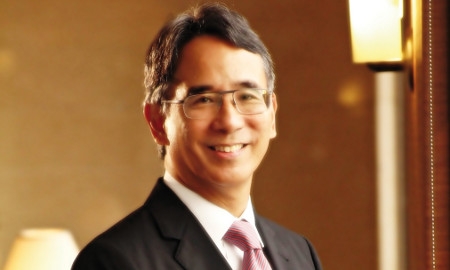Founded in 1851 and based in Makati,
BPI is the oldest bank in Southeast Asia and the largest receiver of overseas Filipino worker (OFW) remittances. Its operations fall into three main segments: consumer banking, corporate banking, and investment banking. It is also heavily involved in micro-enterprise development and encouraging Filipinos to work under their own initiative.
Having served as the President and CEO of BPI since 2005, Aurelio Montinola III received a standing ovation from BPI investors and executives after giving his retirement speech in April and formally passing the reins on to his successor, Cezar Consing, at the Annual Stockholders Meeting.
According to BPI’s Chairman, Jaime Augusto Zobel de Ayala: “Over the past eight years under Mr. Montinola, BPI delivered double-digit compounded annual growth rates (CAGR) amidst many macroeconomic challenges and changes in the banking industry landscape: 10% CAGR on resources from P529 billion to P985 billion ($12.9bn-$24bn), 10% CAGR on revenues from P28 billion to P47 billion, and 12% CAGR on net income from P8.4 billion to P16.3 billion.
“BPI’s average return on equity was 14.5% during the past eight years, while total return to shareholders over the same period was at 214%. Our share price ended 2012 at P95 for a year-end market cap of P338 billion, the highest among the banks on the PSE in 2012.”
Progress through teamwork
Mr. Montinola has long been a firm proponent of achieving results through teamwork and expanding the business organically. During his tenure at the helm, Mr. Montinola oversaw various acquisitions by the Ayala-owned bank – including those of Prudential Bank and ING’s investment unit – and grew BPI to become the third largest bank in the country by assets.
“We always check the business model in an area and then we always try to improve the customer experience and to get people to work together,” says the former CEO.
“So we have a statement: ‘If you focus on the customers and the employees, the business results will follow.’ My own preference for organic growth is that I feel it’s easier to handle, and the bank’s acquisitions are good from time to time. The advantage of organic growth is that you see what the market opportunities are. You are able to mobilize your resources and then you can move forward.”
In the 1980s, BPI focused on its consumer banking arm. It then turned its attentions to the overseas market during the 90s, and the following decade it targeted small and medium-sized enterprises (SMEs).
Management at the bank now have a greater BPI presence in Asia in their sights and are also experimenting with micro-finance. Mr. Montinola adds: “BPI is a steady improver. Maybe in terms of satisfaction, we at BPI have helped the banking industry in the country become one of the best in the world today.”
BPI Foundation
The corporate social responsibility initiatives at the bank are handled by the BPI Foundation. Established in 1978, its programs and activities are based around improving Philippine life in three core areas: entrepreneurship, education and the environment. Its drive to take a more active role in strengthening the capabilities of the nation’s entrepreneurs led BPI to be the first commercial bank to support microfinance institutions (MFIs) through the provision of developmental loans.
To help create a vibrant SME sector, the foundation conducts learning sessions on basic financial and credit management, which are held in key cities nationwide through half-day teach-ins with financial experts from the bank along with the participation of the Department of Trade and Industry.
The foundation has also collaborated with the Institute for Social Entrepreneurship in Asia (ISEA), a learning action network of social resource institutions and social enterprises aimed at strengthening the capacities of social entrepreneurs. Such initiatives fall right in line with the bank’s affirmation that “the life we want does not depend on what we have. It’s what we do with what we have.”
In education, BPI invests in various programs that promote academic excellence as well as efforts to uplift the quality of education.
BPI adopts the attitude that the responsible use of resources is the key towards sustainability. So by helping protect the environment and preserving Philippine heritage through the arts, BPI is helping secure the future of the next generation.

0 COMMENTS